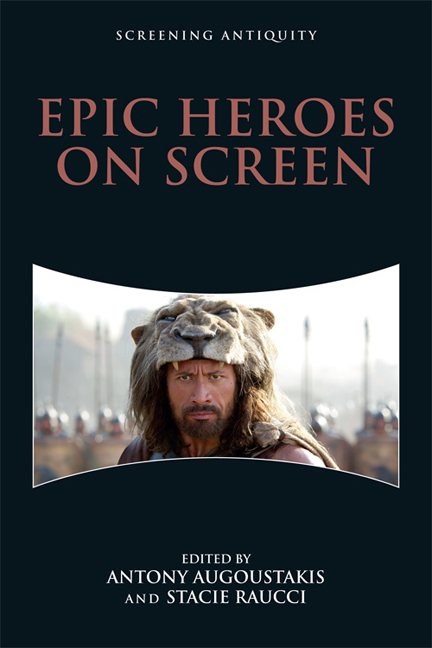10 - Divergent Heroism in Centurion (2010)
Published online by Cambridge University Press: 24 April 2021
Summary
INTRODUCTION
The unexplained disappearance of the Ninth Roman Legion somewhere in Britannia, probably during the reign of the emperor Hadrian, has offered recent filmmakers the opportunity to explore Roman imperialism at a distance from the capital and the corruption that frequently colors the city of Rome in literary and cinematic discourses. The depiction of soldiers far from Rome, under duress, and under attack from native forces using guerilla tactics allows filmmakers to comment on the perils of modern imperialist ventures, especially Bush-era intervention in Iraq and Afghanistan. From such depictions emerges a composite portrait of the Roman legionary soldier who participates in the imperialist project, but experiences first hand the casualties of that project, and who reluctantly defers to bureaucrats who never deign to get their own boots on the ground. In this chapter, I focus on one element of that composite, Centurion Quintus Dias in Neil Marshall's film Centurion (2010), and demonstrate how his character departs from traditional representations of Roman military virtue. I argue that this departure prompts a reassessment of the epic film genre, as well as the nationalist values the genre frequently underwrites.
In order to demonstrate just how Quintus diverges from other soldier-heroes who contribute to the composite observed above, we should initially contrast the near contemporaneous release of The Eagle (2011), based on Rosemary Sutcliff's novel The Eagle of the Ninth (1954), which covers historical ground similar to that explored in Centurion. The Eagle offers viewers a vulnerable but brave Channing Tatum as Marcus Flavius Aquila, who hopes to restore the honor lost by his father, who had led the Ninth Legion on its disastrous final expedition. Marcus’ resistance to and disdain for the Roman administrators hoping to secure the borders of Britain from a safe distance is duly noted, particularly in a scene where the hero criticizes the inexperienced “silk-assed politician's son” for making ill-informed pronouncements on the fate of the Ninth. Still, the film's overall endorsement of Roman military values remains largely unshaken, as Marcus successfully recovers the standard of the Ninth, and returns it to at least nominally appreciative Roman senators. Marshall's Centurion takes a similar soldier’s-eye view of the mystery of the Ninth Legion, but ultimately disavows traditional constructions of military heroism, leaving its titular hero without an army or nation.
- Type
- Chapter
- Information
- Epic Heroes on Screen , pp. 156 - 170Publisher: Edinburgh University PressPrint publication year: 2018

